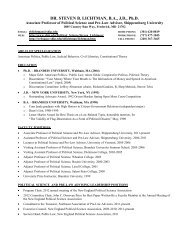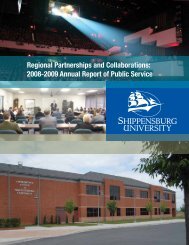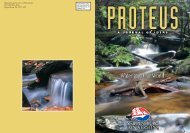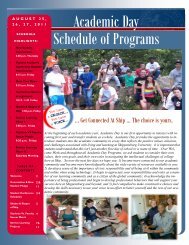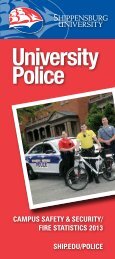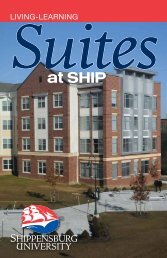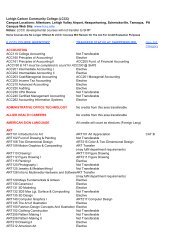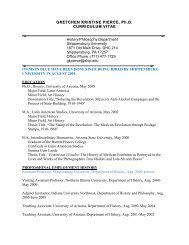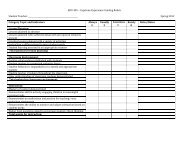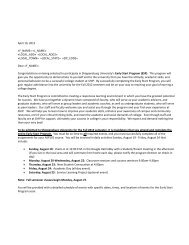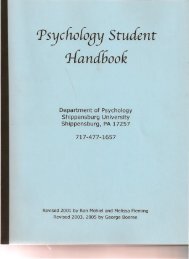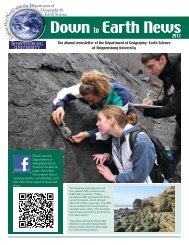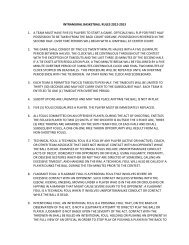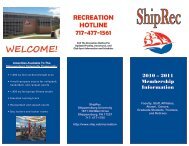Graduate Catalog - Shippensburg University
Graduate Catalog - Shippensburg University
Graduate Catalog - Shippensburg University
You also want an ePaper? Increase the reach of your titles
YUMPU automatically turns print PDFs into web optimized ePapers that Google loves.
Academic Policies and ProceduresPlagiarismPlagiarism is a form of academic dishonesty. <strong>Shippensburg</strong><strong>University</strong> will not tolerate plagiarism, and the faculty will make allreasonable efforts to discourage it.Plagiarism is your unacknowledged use of another writer’s wordsor specific facts or propositions or materials in your own writing.When other writers’ words or materials (even short phrases or specificterminology) are used, you should put these words, phrases or sentencesinside quotation marks (or else indent and single-space moreextended quotations), and you should then cite the source of the quotationeither in the text of your writing or in footnotes. Failure to doso may be considered plagiarism. When the propositions of anotherwriter are restated in your own words (paraphrased), you should alsoindicate the source of the paraphrased material in your own text or infootnotes. Comparable citation should be made for borrowings frommedia other than printed texts, such as lectures, interviews, broadcastinformation, or computer programs.The more flagrant form of plagiarism is your submission of an entirepaper or computer program or lab report (or a substantial portionof a longer work) written by someone else and presented as your ownwork. This can include material obtained from a friend, from a fraternityor sorority file, from duplicated student writings used for analysisin other writing courses, from commercial sources, or from publishedmaterials. Another common form of plagiarism is the unacknowledgedborrowing from other sources (either words or propositions)and the integration of such material in your own work.Certain situations may cause conscientious students to fear plagiarizingwhen they are not really plagiarizing. These include:Improper format for documentationImproper documentation is not plagiarism but a technical academicproblem. Different professors, different academic departments,and different academic disciplines have various ways of documentingborrowed materials. Each professor should make clear to you how he/she wants borrowed materials documented for given writing or programmingassignments. You should make every effort to understandprecisely what your professor expects regarding documentation. Aslong as you make a clear effort to document all borrowed materials,you are not plagiarizing.Use of supplemental individualized instruction on an assignmentVarious tutorial resources are available at the university, includinga writing center and assistance from faculty who assist studentsduring the process of composing a paper. When you seek these kindsof legitimate academic assistance, you are not plagiarizing. In fact,you are making an extraordinary attempt to improve your writing andacademic performance. In such cases, you should inform your instructorof the fact you have sought assistance from a given source on anassignment. This acknowledgement should be stated on the coversheet of your paper or program. The prohibition against plagiarismshould in no way inhibit or discourage you from seeking legitimatesupplemental instruction in developing an assignment.Use of a proofreaderIf you are unsure of your ability to produce finished drafts that arevirtually error-free, you may use such resources as hired typists, moreeditorially proficient friends, tutors, or writing center personnel to insureyour finished papers are relatively error-free. You should indicateon the title page the fact your paper was typed and/or proofread bysomeone else. The prohibition against plagiarism should in no wayinhibit or discourage you from using available reference and/or humaneditorial resources in seeking to produce an error-free final copyof a paper.In summary, plagiarism is the unacknowledged borrowing of anotherwriter’s, speaker’s or programmer’s words and/or propositions.To avoid plagiarism, you should acknowledge assistance received indeveloping and/or proofreading a paper. If you need or desire suchassistance, you should not be discouraged from seeking it because ofthe university policy on plagiarism.23



